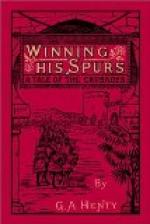“Pest! young gentleman; you have caused us no small trouble and concern. We have had ridings to and fro concerning you, and furious messages from your fiery king. When in the morning a tall, stalwart knave dressed in green was found, slashed about in various places, lying on the pavement, the townsmen, not knowing who he was, but finding that he still breathed, carried him to the English camp, and he was claimed as a follower of the Earl of Evesham. There was great wrath and anger over this; and an hour later the earl himself came down and stated that his page was missing, and that there was reason to believe that he had been foully murdered, as he had accompanied the man found wounded. Fortunately the bulk of the armies had marched away at early dawn, and the earl had only remained behind in consequence of the absence of his followers. I assured the angry Englishman that I would have a thorough search made in the town; and although in no way satisfied, he rode off after his king with all his force, carrying with him the long-limbed man whom we had picked up. Two days after, a message came back from King Richard himself, saying that unless this missing page were discovered, or if, he being killed, his murderers were not brought to justice and punished, he would assuredly on his return from the Holy Land burn the town over our ears. Your king is not a man who minces matters. However, threatened men live long, especially when the person who threatens is starting for a journey, from which, as like or not, he may never return. However, I have had diligent search made for you. All the houses of bad repute have been examined, and their inhabitants questioned. But there are so many camp-followers and other rabble at present in the town that a hundred men might disappear without our being able to obtain a clue. I doubted not indeed that your body had been thrown in the river, and that we should never hear more of you. I am right glad that you have been restored; not indeed from any fear of the threats of the king your master, but because, from what the Earl of Evesham said, you were a lad likely to come to great fame and honour. The earl left in my charge your horse, and the armour which he said you wore at a tournament lately, in case we should hear aught of you.”
Cuthbert gave an exclamation of pleasure. His purse contained but a few pieces of silver, and being without arms except for his short dagger, or means of locomotion, the difficulties of the journey down to Marseilles had sorely puzzled him. But with his good horse between his knees, and his suit of Milan armour on his back, he thought that he might make his way through any dangers which threatened him.
The prior now told the knight that circumstances had occurred, which showed that it was known to the assailants of Cuthbert that he had taken refuge in the convent, over which a strict watch had been kept by Cuthbert’s enemies.




